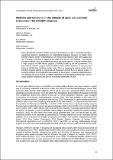Files in this item
Motives and tensions in the release of open educational resources : the UKOER program
Item metadata
| dc.contributor.author | Falconer, Isobel Jessie | |
| dc.contributor.author | Littlejohn, Allison | |
| dc.contributor.author | McGill, Lou | |
| dc.contributor.author | Beetham, Helen | |
| dc.date.accessioned | 2016-07-19T14:30:04Z | |
| dc.date.available | 2016-07-19T14:30:04Z | |
| dc.date.issued | 2016 | |
| dc.identifier | 242658859 | |
| dc.identifier | e9482269-b620-46d7-913c-db143decbeec | |
| dc.identifier | 84995939722 | |
| dc.identifier | 000388304000007 | |
| dc.identifier.citation | Falconer , I J , Littlejohn , A , McGill , L & Beetham , H 2016 , ' Motives and tensions in the release of open educational resources : the UKOER program ' , Australasian Journal of Educational Technology , vol. 32 , no. 4 , pp. 92-105 . https://doi.org/10.14742/ajet.2258 | en |
| dc.identifier.issn | 1449-5554 | |
| dc.identifier.other | ORCID: /0000-0002-7076-9136/work/46761198 | |
| dc.identifier.uri | https://hdl.handle.net/10023/9166 | |
| dc.description | It gives us pleasure to acknowledge the support of the UK Joint Information Systems Committee and Higher Education Academy, who funded the UKOER projects upon which this paper is based. | en |
| dc.description.abstract | Open educational resources (OER) have been promoted as a path to universal education, supporting economic development and intercultural dialogue. However, to realise these benefits requires greater understanding of the factors that influence both OER supply and use. This paper examines an aspect of the supply side of the OER lifecycle – the motives prompting release – and the resultant tensions in the release process. It draws evidence from a major program of OER release projects (UKOER) funded by the UK government. The paper sets the UKOER program within the global context of OER initiatives. It uses grounded theory to identify five candidate motive types. Then, by mapping the actions evident in the UKOER program against an organisational framework derived from an activity system, it examines tensions or contradictions encountered by the projects, revealing unstated motives. The findings will be of interest to funders, institutions and educators releasing OER as they reveal potential limitations and barriers to realising the benefits of OER | |
| dc.format.extent | 348054 | |
| dc.language.iso | eng | |
| dc.relation.ispartof | Australasian Journal of Educational Technology | en |
| dc.subject | OER | en |
| dc.subject | Open educational resources | en |
| dc.subject | Motives | en |
| dc.subject | LB Theory and practice of education | en |
| dc.subject | Education | en |
| dc.subject | NDAS | en |
| dc.subject | SDG 8 - Decent Work and Economic Growth | en |
| dc.subject.lcc | LB | en |
| dc.title | Motives and tensions in the release of open educational resources : the UKOER program | en |
| dc.type | Journal article | en |
| dc.contributor.institution | University of St Andrews. Applied Mathematics | en |
| dc.identifier.doi | 10.14742/ajet.2258 | |
| dc.description.status | Peer reviewed | en |
This item appears in the following Collection(s)
Items in the St Andrews Research Repository are protected by copyright, with all rights reserved, unless otherwise indicated.

